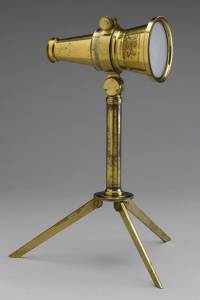Table of Contents
History of Science, a Kaleidoscopic Introduction
Welcome to History of Science! This is an introductory (pre-honours) 1-semester course in the history of science that takes a thematic approach to the subject. Each week, we explore a major theme from the history of science across a wide range of times and places. We will roam among many fields and disciplines, encountering many areas of modern science as well as many areas not commonly thought of as science today. Across the course, we develop critical perspectives on the relationship between scientific knowledge and its historical contexts. The course is taught by Dr Michael Barany.

The course takes inspiration from the kaleidoscope, a philosophical instrument patented by Scottish scientist, inventor, and science historian David Brewster, who went on to spend the last decade of his life as Principal of the University of Edinburgh. Brewster's kaleidoscope was a device at the intersection of art, science, engineering, and the marketplace, a material embodiment of the exciting intersections of knowledge, application, and society. It manifested the idea that a skilled user could learn to produce and be inspired by an infinity of beautiful patterns, generated through a harmonious perspectival construction based on the science of optics. In this course, we will learn the skillful application of historical perspectives to understand science in its many situations, forms, and meanings.
Course Information, Links, and Resources
- Welcome and general information about the course.
- Florilegium. This is the section of the site that students collectively create.
- Reading Resources
- Resource List. Links and library access to reading materials for the course.
- How to 'read like a historian.'
- Announcements archive.
- Pathways through the course for specific subjects.
- Recordings. Whole class sessions from Tuesday and Thursday evenings are recorded whenever possible and available through the university's course site.
- Why are we using an independent site instead of the university's standard course infrastructure?
Themes
Week 1. Cosmologies
The first week of the course is about how things fit together into harmonious wholes. A cosmology is a theory about how the different components of the world relate to each other. We will start with a kind of cosmology of this course, framing our subject matter and understanding how the course is designed. We will then make sense of a variety of cosmologies from the history of science: who developed them, on what basis, and for what purposes?
Week 2. Abstractions
The second week of the course is about how things change and can be used and understood differently when they are grouped, generalized, modeled, or calculated.
Week 3. Collections
The third week of the course is about what happens when people bring a lot of different things into one place, as specimens or artifacts or drawings or descriptions or otherwise. We will explore museums (including the National Museum of Scotland), classifications, data, and what makes some objects ordinary or extraordinary.
Week 4. Lives
The fourth week of the course is about defining and explaining life and transformation in their many forms in the natural world.
Week 5. Bodies
The fifth week of the course is about human and non-human difference, commonality, anomaly, and monstrosity.
Week 6. Quantities
The sixth week of the course is about all the ways people add things up, turn them into numbers, and try to use those numbers to change the world.
Week 7. Measures
The seventh week of the course is about the persistently difficult problem of deciding how big or small things are or how much of a thing there is, and how these challenges have led to fundamental reconsiderations of what is there at all.
Week 8. Particles
The eighth week of the course is about the smallest things and how to find them.
Week 9. Worlds
The ninth week of the course is about the Earth and its transformations, and the many worlds it contains.
Week 10. Objectivities
The tenth week of the course is about how people know what they know, how they confront people who claim to know something different, how to define science and how to change it, and how history and science have been linked together.
Industrial Action Bonus Topic. Science as a Vocation
While industrial action is unlikely during our 2024 course, the issues behind previous years' industrial action remain vital to understanding the past, present, and future of science and of universities. Here is a supplement on Science as a Vocation prepared for previous students who wanted to make their studies during strike days more directly connected to the industrial action. You are welcome to make this a part of your engagement with the course this semester.
